中职英语拓展模块Unit_4
高教版中职英语(拓展模块)Uint 4《Education》2
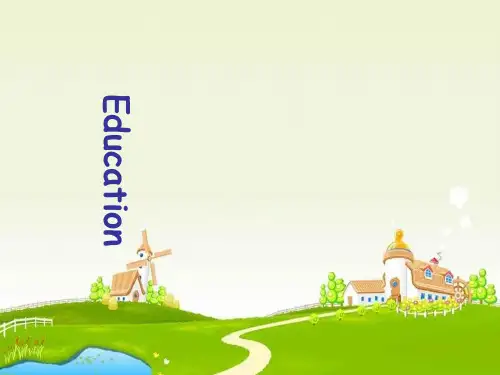
Practice Work in small groups of 4 or 5. without any preparation, tell the others about your primary school. Each student should speak for no more than 60 seconds. Someone in the group should time each speaker, and stop them if they exceed the time limit. After each person has spoken, the others in the group should each ask at least one question. Use a different expression each time you ask a question.
பைடு நூலகம்
Responding to answers
A final aspect of questioning is how you respond to the answer you are given. It’s important to let the person answering your question know whether their answer is satisfactory; for one thing, they need to know if they’ve said enough! If they have, it may be enough simply to nod, or you could say one of the following. Yes, I see. OK, thanks. Thanks, that’s clear now.
英语知识点高教版中职英语(拓展模块)Uint 4《Education》word教案-总结
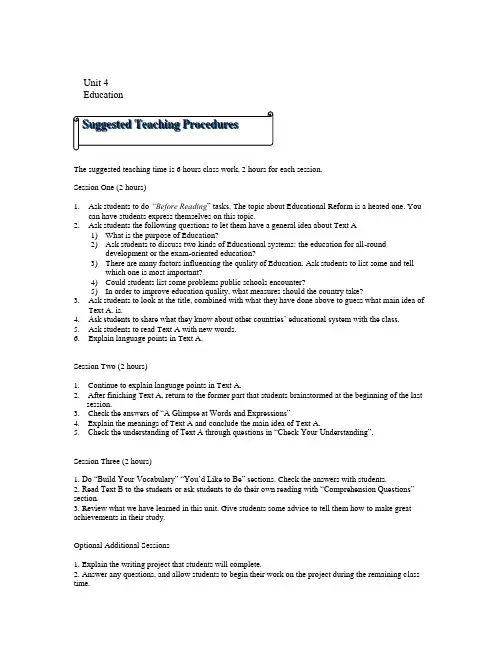
Unit 4EducationThe suggested teaching time is 6 hours class work, 2 hours for each session.Session One (2 hours)1.Ask students to do “Before Reading” tasks. The topic about Educational Reform is a heated one. Youcan have students express themselves on this topic.2.Ask students the following questions to let them have a general idea about Text A1)What is the purpose of Education?2)Ask students to discuss two kinds of Educational systems: the education for all-rounddevelopment or the exam-oriented education?3)There are many factors influencing the quality of Education. Ask students to list some and tellwhich one is most important?4)Could students list some problems public schools encounter?5)In order to improve education quality, what measures should the country take?3.Ask students to look at the title, combined with what they have done above to guess what main idea ofText A. is.4.Ask students to share what they know about other countries’ educational system with the class.5.Ask students to read Text A with new words.6.Explain language points in Text A.Session Two (2 hours)1. Continue to explain language points in Text A.2. After finishing Text A, return to the former part that students brainstormed at the beginning of the lastsession.3. Check the answers of “A Glimpse at Words and Expressions”4. Explain the meanings of Text A and conclude the main idea of Text A.5. Check the understanding of Text A through questions in “Check Your Understanding”.Session Three (2 hours)1. Do “Build Your Vocabulary” “You’d Like to Be” section s. Check the answers with students.2. Read Text B to the students or ask students to do their own reading with “Comprehension Questions” section.3. Review what we have learned in this unit. Give students some advice to tell them how to make great achievements in their study.Optional Additional Sessions1. Explain the writing project that students will complete.2. Answer any questions, and allow students to begin their work on the project during the remaining class time.3. As students work, provide feedback and support. Encourage students to make their own plans and to make discussions with other students.Web Resources/blogs/19833/(How_Public_Education_Cripples_Our_Kids_and_Why)/DEBATES/public_education_failure.HTM(公立学校的讨论)/library/news/aa050400a.htm(debate on the school spending)/pubtopic.htm(education policy)/Research/ressinglesex.html/student/Is_single_sex_education_better.htmlAfter studying this unit, students should be able to:Understand the controversy over single-sex education; the main crux of public education and its temporary condition in AmericaToday, formal education serves a greater percentage of the U.S. population than at any time in history. It played an important role, but still exist some problems. The influence of modern psychology and of education reformers such as John Dewey caused schools to become less formal, more relaxed, and somewhat more centered on the individual child rather than on the institution or the society. School facilities improved for most students, except perhaps in the inner cities. More money was spent on education, resulting in both a general upgrading of teacher salaries and improvements in programs that focus on specific kinds of students, such as special education.Besides, some members of the school reform movement believe that too little power exists at the local level. They claim that teachers and schools can increase their effectiveness only by having greater authority over such fundamental matters as curriculum content, teaching methods, and hiring of staff. Other reformers contend that not all local communities have the resources to provide quality education. They argue that to meet goals of equity and excellence, all local districts should meet high educational standards and provide ample school budgets.What’s more, in America, as for education, people hold different point of view about this question which works better: single-sex education or co-education?The conventional thinking thirty years ago was that education would break down gender stereotypes. Also, promoting equality of the sexes and eliminating gender bias have been a huge societal theme for several decades now. With that in mind coeducation which is based on that laudable theme of equality seems like the right way to go. However, some believe that coeducation does not work for every child. The same sex education is the better choice for the education of the youth of today. Since students are the potential of the future economy, it is our responsibility to provide them with best that we can. Same sex education can help, and can help a lot.Also, we know the plain truth that boys and girls learn in different ways. Research shows that a girl's brain is different from a boy's brain. One size does not fit all. Besides, some view single sex education as an opportunity to capitalize on the learning differences inherent in boys and girls.From the above, we can know that as for education in America, there is a lot of debate. With the study of Text A and Text B, let students grasp the general idea of American education.Before moving into Text A, the instructors should lead students to doing “Before Reading” and “A Glimpse at Words and Expressions” which will help warm up the students. Students’ preview of both TextA and TextB should be strongly encouraged.☞ Develop the ability of critical thinkingIn this section, one should know what is critical thinking?Critical thinking is that mode of thinking - about any subject, content, or problem - in which the thinkerimproves the quality of his or her thinking by skillfully taking charge of the structures inherent in thinkingand imposing intellectual standards upon them.Critical thinking can be seen as having two components: 1) a set of information and belief generatingand processing skills, and 2) the habit, based on intellectual commitment, of using those skills to guidebehavior.What is a good critical thinker?•raises vital questions and problems, formulating them clearly and precisely; •gathers and assesses relevant information, using abstract ideas to interpret it effectively comes to well-reasoned conclusions and solutions, testing them against relevant criteria and standards; •thinks open-mindedly within alternative systems of thought, recognizing and assessing, as need be, their assumptions, implications, and practical consequences; and • Communicates effectively with others in figuring out solutions to complex problems.Critical thinking is, in short, self-directed, self-disciplined, self-monitored, and self-correctivethinking. It presupposes assent to rigorous standards of excellence and mindful command of their use. Itentails effective communication and problem-solving abilities and a commitment to overcome our nativeAfter studying this Unit, the instructors should teach students how to read texts critically? How todevelop a habit that while reading they should hold a question mark in their mind? And with Text A andText B, the instructors should set an example to students on how to read texts in a critical way, and thenencourage students to read books after class in a critical way.☞ Extend vocabulary through recognition of prefixes of degree and sizeIn this section, the instructor should explain to the students the prefixes of degree or size. Firstly, letstudents understand the meaning of the prefixes; then encourage students to put them into practice, teachingthem how to make up new words by adding such prefixes to original words. Through learning this section,instructors should cultivate the students to develop a habit that while encountering strange words, theyshould analyze the formation of the word to guess its meaning and in addition, teach students how to useprefixes of degree or size to enlarge their vocabulary. Instructors could teach prefixes of degree or size withexercises in “Building Your Vocabulary ”.1. Browse the Websites, /usaeducationsystem.htm, and try to get familiarwith the development of American Education System . 2. The instructors should introduce some good American newspapers to students such as USA Today,New York Times, Los Angeles Times, Washington Post, etc or some websites and read articles: for example /~cma8660/mirror//chapters/.After students search some material related to this Unit, the instructor should allow them to find theirpartners to have a discussion about the Education in America.e L e a a r r n n i i n n g gA Glimpse at Words and ExpressionsPlease read the following sentences. Pay attention to the underlined part in each sentence and see how these expressions are used in the context, and then write down their meanings in the blanks provided.1. Academic standards have sunk out of sight. (have decreased or even disappeared).2. When those poor results are recognized, the system and its defenders can be counted on to say that the problem is insufficient spending. ( sure that sth will be happen)3. Reich argues that while public school systems in affluent areas are turning out students who are college or work-ready because they have le arned “to identify and solve new problems, recognize patterns, and think critically,” schools in poorer areas are not able to do that. ( are making or producing)4. Therefore we have to do something to equalize spending so that all students will have an equal shot at a good education. ( the act of trying to do or achieve sth)5. We know that because there are many nongovernmental schools in poor urban areas that produce remarkably skilled graduates, despite the fact that they operate on shoestring budgets. (run nongovernmental schools with little money)6. He wants to do away with local property taxes to fund public education and institute a national wealth tax instead.(to make sth end)7. People are entitled to do what they want with their own income or wealth. ( given the right to have or to do)8. Education establishment’s appetite for money is unending, and once the camel had its nose inside the wealth-tax tent, it would continue pushing in.(it is a metaphor, meaning that once the Educational Institutions got the national wealth tax)9. The late Peter Bauer used to point out that foreign aid did far more to prop up tyrannical regimes that to help hungry people. (to help sth that is having difficulties)An introduction to Text AThe title of Text A points out its main theme that this text mainly concerns the issue whether national wealth tax should fund Education or not. And with the comparison of public education and nongovernmental education, this text states that the amount of money put into education is not in proportion to the education’s quality. In addition, it also mentions the problems besetting the public education and provides some solutions.Suggested explanations on Text A1. While some students graduate from public schools with sharp intellectual skills (often owing more to their home environment than to their school instruction), many others drift aimlessly through 12 years of classes where little is expected of them, academic standards have sunk out of sight, and discipline is a joke. “While”(used at the beginning of the sentence)The usages of “while”1) as the conj.a.during the time that sth is happening.eg (1) we have run into many famous stars while (we are) in BeiJing.(2) While I was waiting at the bus stop, three buses went by in the opposite direction.b. at the same time as sth else is happening.eg The burglar is decoding my safe while I unlock the door.c.. used to contrast two things.eg (1) While Jacky is well versed in mathematics, his sister is absolutely hopeless.(2)Other men live to eat, while I eat to live.2)as noun.a period of timeeg Every time I always wait for quite a while in order to get the cheapest goods.3) as verbThe phrase “while sth away” : to spend time in a pleasant lazy way.eg Every day, he whiled away the time playing cards and watching TV.graduate from: to complete a course in education especially at high school.eg She graduated from that famous high school.graduate (in sth) from sth: to get a degree, especially your first degree, from your university or college. eg She graduated from Harvard with a degree in psychology.2. many others drift aimlessly through 12 years of classes where little is expected of them,…….to drift (verb): to happen or change or to do sth without a particular plan or purposeeg I didn’t intend to be a teacher----I just drifted into it.to drift (verb): to move along smoothly and slowly in water or aireg Thousands of lanterns slowly drift out to sea guiding the dead on their return journey to the other world.to drift (verb): to move or go somewhere slowlyeg people drifted away from the scene of the accident.3. ……and discipline is a joke.discipline (noun) the practice of training people to obey rules and orders and punishing them if they do not; the controlled behavior or situation that results from this trainingeg 1) Stern discipline did not achieve the desired result.2) Strict discipline does not always work in terms of developing children's personal qualities. Too much pressure on children leads to rebellion and other extreme actions.to discipline (verb): to train sb, especially a child, to obey particular rules and control the way they behaveeg Schools try their best to take measures to discipline the students.to discipline yourself: to control the way you behave and make yourself do things that you believe you should doeg You must discipline yourself to finish your work on time.4. Thanks to strict state licensing laws, it is almost obligatory for anyone who wants to teach in public schools to go through a lengthy course of study in a college or university “school of education, “where the emphasis is on dubious pedagogical theories such as cooperative learning and multicultural sensitivity rather than on the mastery of subject matter and how best to impart that knowledge to students.thanks to (followed by the sb/sth), used to say that sth has happened because of sb/sth.eg Thanks to our clever leader, our company avoided going bankruptcy.It is for sb to do stheg It is for you to do the thorough cleaning.impart sth to sb/sth to pass information, knowledge etc to other peopleeg I have no news to impart (to you).rather thaneg We are to blame rather than they.The usages of “rather than”rather than 可作连词词组使用,连接两个并列成分,表示在两者中间进行选择,意为“是A 而不是B ”、“要A 不要B ”、“宁愿A 而不愿B ”等,后面可以接名词、代词、形容词、副词、动词和动词不定式等。
语文版中职英语(拓展模块)Unit 4《Colors and Mood》ppt课件3
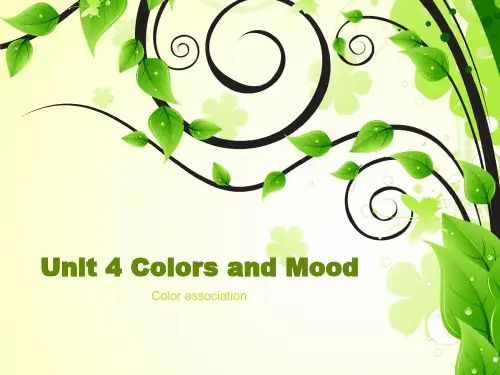
Color association
Teaching aims
Learning the meaning of color in our daily life.
2. Master the new words and useful phrases.
3.Understanding that effect articles.
If someone is beaton so hard that one is covered with bruises, people say this person is beaton black and blue.
be covered with 被…盖满,覆盖
eg:The worth was covered with snow.
a yellow line 一道黄线
tell sb not to do sth 告诉某人不要做某事
tell sb to do sth 告诉某人干某事
When someone is sad, one would say," I'm feeling blue."
felling blue 很伤心 blue相当于sad,译为“忧伤的,沮丧的” eg:I felt blue when I failed infinal exam。
4.In the north region,the ground round.
is covered with
snow all the year
Warming up
Review the knowledge of the last class.
be associated with 与…有关,联系起来
中职英语拓展模块练习册Unit 4完形译文教学教材
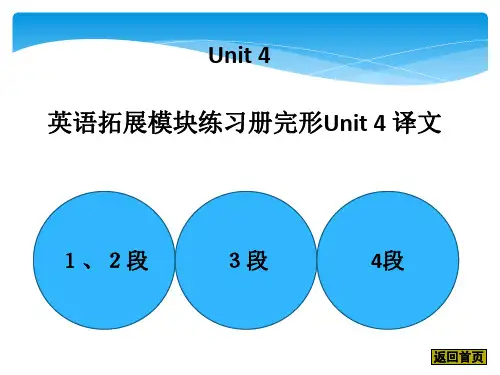
返回首页
To help you understand the messages your senses receive, you need experience. Your experience is made up of every single thing you have done in your life and everything that has ever happened to you. It is everything you have ever seen, heard, smelled, tasted or felt.
你的经验是由你在生活中所做的每一件事,及发生在你 身上的每一件事所组成的。
返回首页
To help you understand the messages your senses receive, you need experience. Your experience is made up of every single thing you have done in your life and everything that has ever happened to you. It is everything you have ever seen, heard, smelled, tasted or felt.
语文版中职英语(拓展模块)Unit 4《Colors and Mood》ppt课件3
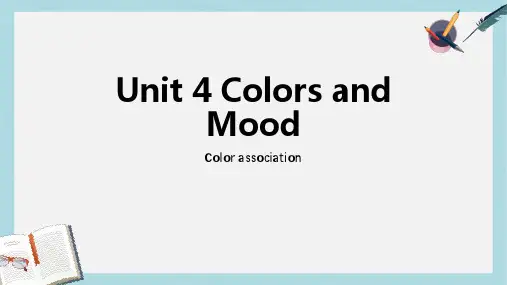
• The word "blue" is interestingly connected with the stock market.
• be connected with 与…有关系,与…联系在一起
• eg:Whisky is usually connected with Scotland.
• interestingly “有趣地,有意思地” 是由 interesting加-ly 构成的 副词,在句中作状语。
• yellow color vests 黄色的背心 • warn sb of sth 提醒某人某事,警告/告诉某人某事 • eg:I warned him stay here. • warn sb not to do sth 让人别做某事 • warn sb +that-clause 提醒/告诫某人某事 • eg:I warned him not to smoking in the school.
• yellow ribbon 黄色的丝带 • She has a yellow ribbon.
• expect sb to do sth 期待 某人做…,盼望某人做…
• eg:I expect you to not talking and sleeping in class
• Policeman in the street wear yellow color vests to warn vehicles of their presence.
同时,大家要开动脑筋,思考老师是怎样提出问题、分析问题、解决问题的,要边听边想。为讲明一个定理,推出一个公式,老师讲解顺序是怎样的, 为什么这么安排?两个例题之间又有什么相同点和不同之处?特别要从中学习理科思维的方法,如观察、比较、分析、综合、归纳、演绎等。 • 作为实验科学的物理、化学和生物,就要特别重视实验和观察,并在获得感性知识的基础上,进一步通过思考来掌握科学的概念和规律,等等。 • 二、听文科课要注重在理解中记忆 • 文科多以记忆为主,比如政治,要注意哪些是观点,哪些是事例,哪些是用观点解释社会现象。听历史课时,首先要弄清楚本节教材的主要观点,然 后,弄清教材为了说明这一观点引用了哪些史实,这些史料涉及的时间、地点、人物、事件。最后,也是关键的一环,看你是否真正弄懂观点与史料间 的关系。最好还能进一步思索:这些史料能不能充分说明观点?是否还可以补充新的史料?有无相反的史料证明原观点不正确。 • 三、听英语课要注重实践 • 英语课老师往往讲得不太多,在大部分的时间里,进行的师生之间、学生之间的大量语言实践练习。因此,要上好英语课,就应积极参加语言实践活 动,珍惜课堂上的每一个练习机会。
中职英语拓展模块教案第四周
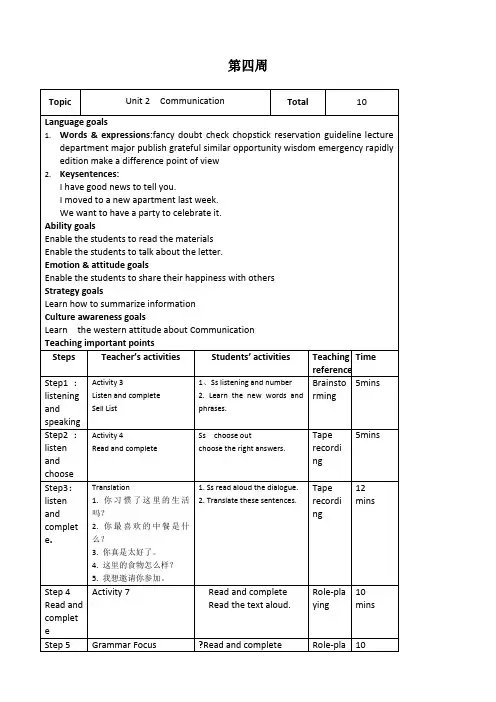
2. Learn the new words and phrases.
Brainstorming
5mins
Step 2readandchoose
1.get the Ss toreadand chooseActivity7
2.Check their work
How much does it cost?
I think we can arrange that.
When do you want to go?
How many people are going?
Steps
Teacher’s activities
Students’ activities
Teaching
Time
Step1:listening and speaking
Activity 3
Listen and complete
Sell List
1、Ss listening and number
2. Learn the new words and phrases.
Brainstorming
5mins
Step2:listenandchoose
Role-playing
10
mins
Step 5
Read and practice
Grammar Focus
?Read and complete
Read andchoose.
Role-playing
10
mins
Step 6
Assessing
Give marks to each group.
Ss talk about their performance
中职英语拓展模块练习册Unit 4完形译文
骑马是一种体验。跌到楼下也是。
返回首页
To help you understand the messages your senses receive, you need experience. Your experience is made up of every single thing you have done in your life and everything that has ever happened to you. It is everything you have ever seen, heard, smelled, tasted or felt.
Unit 4 英语拓展模块练习册完形Unit 4 译文
To help you understand the messages your senses receive, you need experience. Your experience is made up of every single thing you have done in your life and everything that has ever happened to you. It is everything you have ever seen, heard, smelled, tasted or felt.
中职教材英语(拓展模块)教学课件U4
Rhythm and Blues traces its roots directly to Jazz and the old black Gospel music. The narrative form and rich beat of these styles also form the basis for today’s Rap and Hiphop. It is this music that gives the basis of the rhythms of modern US popular music.
The 1980s and 1990s was influenced by Latin music. Rap, Country and R&B have been fuelled by Latin beats. The rhythms of Rock and Roll have become the dominant force in US music, and the lines between other forms have blurred.
leisure time. 3. design a poster.
Look at the picture and discuss:
1. How are you getting along with your parents? 2. How could you build a good children-parents relationship?
Musical forms are no longer segregated by race today, as the forms have merged across the lines of culture in the US. American music does what music has always done— bringing people together. The effect of this mix of music and cultures may be seen everywhere.
中职英语拓展模块-Unit-4
• 5.What is a blue-chip? A blue chip refers to _a_p_r_o_m_i_s_in_g__a_n_d_s_a_fe__s_h_a_re__ in the stock market.
The shape of heart means __lo_v_e__.
P1:Colors are often associated with different _o_b_je_c_t_s_、_fe_e_l_in_g_s__ and _h_o_li_d_a_y_s_.
He s_e_e_s_r_e_d_.
A holiday is called _a__re_d_-_le_t_te_r_ day .
_G_u_e_s_ts_o_f_h_o_n_o_r _are usually given a red-carpet treatment.
When someone is caught in the middle of stealing, people say that he was caught _re_d_-_h_a_nd_e_d_.
5. greenhouse e) warmest welcome
6. a blue-chip f) workers
Read the text paragraph by paragraph ,and get the main idea of each paragraph.
Green is associated with _C_h_r_is_t_m_a_s__.
stock market, a _p_r_o_m_i_si_n_g and safe share is called a _b_lu_e_-_c_h_ip_.
职高英语拓展模块unit4作文
职高英语拓展模块unit4作文Unit 4: Life in a Multicultural SocietyIn today's globalized world, it is becoming increasingly common for people from different cultures and backgrounds to live and work together. This multicultural society presents both opportunities and challenges, as individuals must learn to navigate and appreciate the diversity around them. In this unit, we will explore the benefits and complexities of living in a multicultural society and discuss ways to promote understanding and harmony among diverse groups.One of the key advantages of living in a multicultural society is the opportunity to learn about and experience various traditions, languages, and customs. Exposure to different cultures can enrich our lives, broaden our perspectives, and foster creativity. By interacting with people from diverse backgrounds, we can develop empathy, tolerance, and communication skills that are crucial for success in today's interconnected world.However, living in a multicultural society also poses challenges, such as language barriers, misunderstandings, and cultural clashes. In order to overcome these obstacles and build aharmonious community, it is important to promote mutual respect, open-mindedness, and intercultural dialogue. By cultivating a culture of inclusivity and acceptance, we can create a more welcoming and unified society where everyone feels valued and respected.To enhance our understanding of multiculturalism and promote social cohesion, we can engage in activities that celebrate diversity, such as cultural festivals, language exchanges, and community events. By participating in these initiatives, we can break down stereotypes, build bridges between different groups, and foster a sense of unity and belonging.In conclusion, living in a multicultural society offers a wealth of opportunities for personal growth, cultural enrichment, and social cohesion. By embracing diversity, promoting understanding, and fostering inclusivity, we can create a more vibrant, tolerant, and harmonious community where everyone can thrive. Let us strive to build a world where differences are celebrated, and where unity and respect prevail.。
- 1、下载文档前请自行甄别文档内容的完整性,平台不提供额外的编辑、内容补充、找答案等附加服务。
- 2、"仅部分预览"的文档,不可在线预览部分如存在完整性等问题,可反馈申请退款(可完整预览的文档不适用该条件!)。
- 3、如文档侵犯您的权益,请联系客服反馈,我们会尽快为您处理(人工客服工作时间:9:00-18:30)。
C. Pupil Progress Report D. Notice to the students
5. Act and practice.
Situation
Mike is going to change his job next year. He wants to take an accounting course for the certificate examination. Now he is talking to the staff of the training school.
E. How old is your son?
W: Not too bad. _________________________? M: Five percent. W: OK. I’d like my child to attend this school. M: We only accept students from 15 to 19. ___________? W: My son is sixteen.
Reading Club Everybody that loves reading is welcomed. Come and join us in Classroom 201, Building 3, at 4:00 in the afternoon every Wednesday. You will have a chance to read the best sellers and share your idea with others.
Course: Accounting Time: 8 pm, every Tuesday and Thursday Cost: 1,800 RMB Registration: Filling in the form or registering online
6. Read and match.
A. Poster of a language course B. Brochure for international students
B. Cambridge. D. Harvard.
32 When will Mary begin her study in the new school?
A. September. C. March.
B. August. D. January.
43 What preparation should Mary make before leaving?
and painting courses for our students too. W: __________________________? M: 8000 per year. W: __________________________? M: Yes, we offer three levels of scholarships. The highest level is 2000
A. Register for class. C. Call the teacher.
B. Buy the textbook. D. Rent an apartment.
4 What will not the woman study?
A. History. C. Philosophy.
B. Math. D. Science and Art.
yuan.
4. Read and complete.
A. Do you offer any scholarቤተ መጻሕፍቲ ባይዱhips?
B. How much do you charge every year?
C. What courses are open in your school? D. How many students can get the scholarship?
1. Listen and match.
Amy Sara Caro Jenny
New staff training French Cooking Chinese
2. Listen and choose.
1 Which university will Mary study in?
A. Oxford. C. Yale.
E. How old is your son?
W: Hello, I want to enroll my child in your school. __________? M: All of the regular courses are open. Moreover, we open art, dancing
5. Act and practice.
Situation
July is a first year student of Beijing University. She loves reading and joins a school club. Now she is making a phone call to tell her friend Lily about it.
_________4__________
4. Read and complete.
A. Do you offer any scholarships?
B. How much do you charge every year?
C. What courses are open in your school? D. How many students can get the scholarship?
3. Listen and complete.
Name
_K_a_r_en__H_u__a_n_g_________
Major
_H_o_t_e_l _m_a_n_a_g_e_m__e_n_t____
Classes Total
English; English literature; Computer; _A_m_e_r_i_c_a_n_H__is_t_o_r_y____
